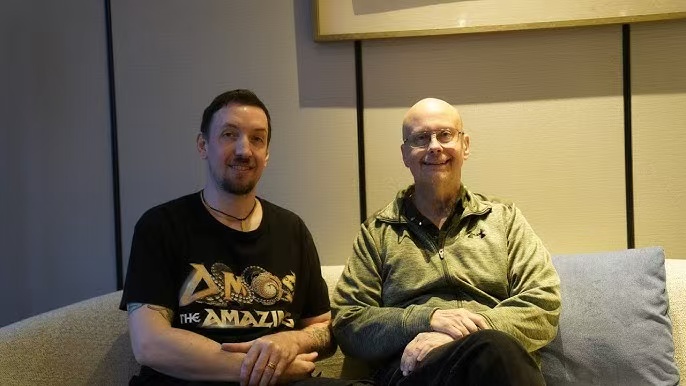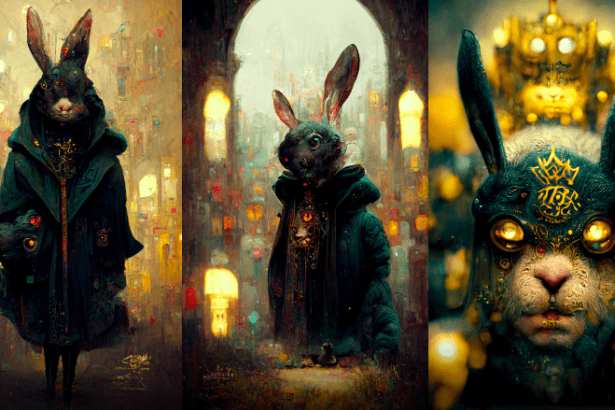By Jorah Kai, with insights from Robert J. Sawyer

Robert J. Sawyer explores AI, futurism and consciousness in both his work and our changing world.
Setting the Scene
I hadn’t had the opportunity to connect meaningfully with Robert J. Sawyer since last year’s World Science Fiction Convention in Chengdu, just a quick 40‑minute ride from my home in Chongqing. Robert headlined China’s first World Sci‑Fi fair alongside another big name these days—Liu Cixin. Covering the event for iChongqing was an unforgettable experience, giving me the chance to get to know both Robert and Liu Cixin. Life moves quickly here in Southwest China, though. Now, with my Chongqing Chinese solarpunk fantasy novel Amos the Amazing set to publish in Chinese with Chongqing Publishing Group, and my new English novel The Sun Also Rises on Cthulhu hitting American shelves in April, I found myself eager to reconnect with Robert and pick his brain on where he thinks our future might be headed.
Though the excitement of the Chengdu sci‑fi fair still lingers, our world has raced ahead—pushing the boundaries of flying cars, artificial intelligence, and beyond. Early in 2025, it was time for a call.
We reconnected over the phone—he in Canada, me in Chongqing. Despite the distance, the conversation flowed as though we were side by side, perhaps a sign of just how connected our world has become. As we spoke, I shared how much has changed in Chongqing’s tech scene, which is buzzing with the promise of flying cars and advanced AI. Robert’s characteristic, measured scrutiny balanced my enthusiasm.

Two-seater detachable ‘flying car’ debuts in Chongqing.
Flying Cars Take Flight
When I mentioned Changan’s investment of 20 billion yuan into the local flying car industry, Robert wasn’t entirely surprised, but he weighed the ambitious scope of such a project. I also brought up Sam Altman’s claims of nearing AGI (artificial general intelligence and noted that China’s Deepseek was catching up to OpenAI in many ways.
As futuristic travel becomes real, the conversation naturally drifts toward even more transformative technology—artificial intelligence.
AI at an Inflection Point
“Are we heading toward the singularity?” I asked, pointing to Altman’s bold statements.
“We’re already at the stage where AI passes some basic version of the Turing test right off the bat,” Robert noted, discussing changes in publishing. “Publishers and movie studios are already swamped with AI-written or AI-assisted scripts. A manuscript comes in, and you can’t tell in the first paragraph. Nobody who ever felt or loved or was in a relationship or had a child, or watched a parent die, or smelled a daisy, or wondered what was going to happen to them until they’re dead wrote this. There’s no telltale sign.”
It struck me as a double‑edged sword. On the one hand, advanced tools are now available to everyone—once upon a time, only the elite had access to truly capable personal assistants. On the other hand, Robert painted a picture of humanity willingly creating something that might ultimately surpass us.
“Well, we are certainly at an inflection point—a turning point in human history. For all of recorded history, we’ve been the top dog. Never before has a species willingly created something that could usurp it,” he said. “The dinosaurs didn’t take a vote and decide, ‘You know what? We’ve had a good run; let’s make way for the mammals.’ They died out against their will.”
Robert went on to express skepticism about humanity’s headlong rush toward general artificial intelligence. “Yet here we are, racing headlong into unleashing general artificial intelligence on the human race—something that could strip us of all the roles humanity has traditionally filled. And frankly, the justification for this eludes me as a science fiction writer.”

Cassandra Dreaming and Cautious Critique
As we delved deeper, Robert revealed he’s working on a new book called Cassandra Dreaming, referencing the Greek mythological figure cursed to always predict the future accurately but never be believed.
“For decades—nearly a century—my colleagues in science fiction have been warning about the dangers of self‑aware, self‑motivated machines. And yet here comes Sam Altman, saying, ‘Oh, I’ve got an idea—why don’t we do this thing?’” he said, his words tinged with skepticism.
When asked what troubled him most, Robert didn’t mince words:
“My concern is: why are we doing this other than for the short‑term buck? Remember, when OpenAI started, it was billed as altruistic, open‑source, and transparent. But now? Altman is one of the richest men on the planet. So I’m very skeptical of anyone who says, ‘This is going to be great for humanity.’ It might be great for their bottom line, but humanity? That’s another matter entirely.”
He cautioned that while AI can deliver convenience, it also presents a risk of ceding too much control.
I found myself wondering if ceding control to a benevolent AI might solve some systemic human problems. Yet Robert’s reservations run deep—rooted in a belief that perfect governance, driven by a black box, remains far from realistic.
The Human Element
“I, for one, have been disillusioned with ‘democracy’ prioritizing corporate interests over the public good,” I admitted. “Wouldn’t a truly benevolent AI fix that?”
But Robert was circumspect.
“Nobody has come up with an ideal system for governing human beings. So the idea that we’ll just throw up our hands and leave governance to a black box is absurd. Neural networks, for example, aren’t auditable. You put X into the system, Y comes out the other end, and you can’t trace back how it got there. This lack of transparency is incredibly dangerous when applied to governance or critical decision‑making.”
He reminded me that accountability is a cornerstone of any trustworthy system.

A computer’s rendering of concept art of consciousness uploading—an evolving sci‑fi trope done in the manner of a sci-fi trope.
Uploading Consciousness (and the Transporter Problem)
Shifting gears, Robert mentioned another major project tentatively titled Ghosts in the Machine, exploring the idea of uploading or copying consciousness. He stressed the difference between truly “moving” your mind and merely creating a copy.
“We talk about uploading consciousness right off the bat. That is an error in the labeling of it because you’re not uploading consciousness; you’re copying onto it, which means the original is still there,” Robert explained. “We can talk about, ‘Oh, I’m going to upload my mind into the Matrix, into an android body.’ No. There’s going to be a copy of your mind that is discontinuous in its experience from your experience. And if you want it to have the full right of being you, then you have to be eliminated.”
I realized immediately this mirrored the unspoken dark side of Star Trek–style transporting—something I’m looking to include in my own upcoming sci‑fi trilogy. As AI evolves, the notion of duplicating a mind no longer seems quite so outlandish.

Jorah Kai and Robert J. Sawyer discuss their desire to realize ‘Star Trek’ and not ‘Mad Max’ at 2023 Worldcon in Chengdu, China
Preserving the Human Spark
Naturally, the discussion circled back to what we both cherish: human creativity.
“Make the writer and the director as much of a star as the actor. Human beings. We don’t want stuff—novels and movies—that has been made by a soulless machine, not if you value human creativity,” Robert said.
“Science, debate, and creativity stabilize society. These are not things we can afford to automate away.”
He used a washing machine analogy to emphasize that AI should eliminate drudgery, not human thought:
“It’s dirty, repetitive, boring work. But it has to be done. That’s what we get a machine to do. Nobody said, ‘Ah, the dishwasher is awful, taking away all that fun of washing dishes.’ Let them have it, and now I can go and write my poetry or spend time with my kids. AI should be our next tool in the kit that we’ve had ever since the dawn of the Industrial Revolution for eliminating drudgery—not eliminating thought.”

The Downloaded, by Robert J. Sawyer, coming to the Chinese market in 2025 via Cheers Publishing (Beijing).
Lessons and Advice for Future Writers
As an English teacher, I had to ask Robert for advice for younger writers. His response showcased a mix of insight and genuine encouragement:
“Science fiction is the WikiLeaks of science. It’s where cutting‑edge ideas reach the public first, long before they become mainstream,” he said. “The role of the science fiction writer isn’t to be a cheerleader for technology—it’s to be its critic. While tech companies promise the world, it’s our job to say, ‘Hold on, have you considered the consequences?’ We need to explore the second, third, and fourth‑order effects of their grand ideas.”
He also pointed to Elon Musk’s Mars ambitions, cautioning that writers should address real‑world challenges like radiation risks and human biology.
Parting Thoughts
Our call ended as warmly as it began, with a mutual promise to chat again soon. Neither of us claims to have all the answers—AI, flying cars, or consciousness transfers—but that’s part of the thrill of science fiction: to speculate, to warn, and to inspire.
The future beckons, but it won’t be without its ethical crossroads. Fortunately, with creative minds like Robert J. Sawyer on the case, we’re at least asking the tough questions.
As I hung up, I felt camaraderie in facing an uncertain tomorrow. Pen in hand, imagination fully engaged, I’m heading forward—glad to have friends like Robert J. Sawyer to share thoughts and keep the conversation alive.
About the Authors
 |

Robert J. Sawyer (left) and Jorah Kai (right) continue to shape futuristic narratives.
- Robert J. Sawyer is a Canadian science fiction writer and a member of the Order of Canada. He has won the Hugo, Nebula, and Robert A. Heinlein Awards for Best Novel. His latest novel, The Downloaded, is set to be released in Chinese by Cheers Publishing (based in Beijing). His newest work, Ghosts in the Machine, is currently in progress. Follow his latest news on his official website:
sfwriter.com - Jorah Kai is a Canadian teacher and author based in Chongqing. His solarpunk fantasy novel, Amos the Amazing, is scheduled for release in Chinese this April with Chongqing Publishing Group. His novel, The Sun Also Rises on Cthulhu, a creative reimagining of Ernest Hemingway’s classic as literary horror, will be released in April in America on More Publishing, alongside a poetry book called Sad Songs from an Old Goth in a Tree. You can read more at
jorahkai.com
Listen to the whole conversation here:
Or on soundcloud: https://soundcloud.com/freedom-danish/robert-j-sawyer-interview-jan-15-2025



